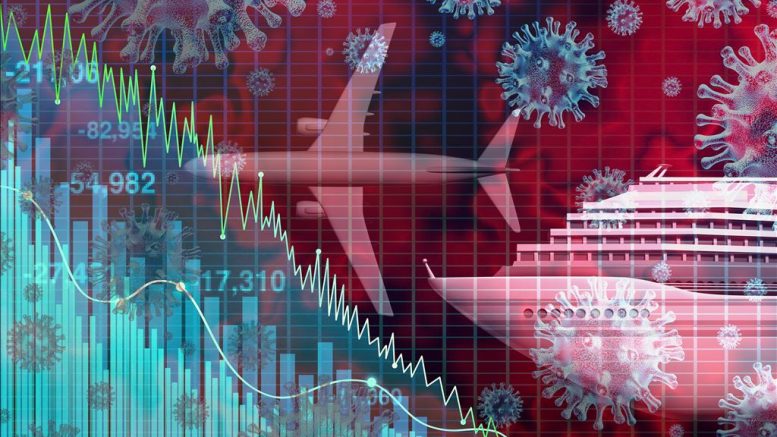There are powerful forces with deeply vested interests in ensuring that the world that existed before the pandemic is the world that emerges after it, writes Geoff Kitney.
The fear factor has made a big comeback in the affairs of the world.
Not since the Cold War and the threat of nuclear conflagration have populations been so worried about their personal circumstances. More fearful now than after the September 11, 2001 World Trade Center terrorist attacks. More fearful now than during any of the periodic financial crises, including the 2007-08 Global Financial Crisis.
Around the globe, from the great democracies to the most repressive regimes, ordinary citizens are suffering from extreme levels of anxiety.
The threat that the coronavirus, Covid-19, poses to their health – a virus for which currently there is no cure, other than the ability of our immune systems to fight it off – is compounded by the dangers posed by economic collapse induced by the measures to stop the spread of the virus.
Catch 22 has become a way of life for most of the world’s citizens.
That we are living in a traumatised world amid unprecedented uncertainty is the only certainty now.
But what comes next?
What will be the world that emerges from the present chaos?
High death tolls are already being seen as simply a price to be paid for the sake of a return to business as usual.
In his recent contribution to Chief-Exec.com, Australian politician Senator Kim Carr argued that the trauma of the Covid-19 virus should result in a future in which the “neoliberal assumptions that have held sway over economic policy-making for a generation” must be abandoned and replaced with a new economic agenda in which sovereignty in such things as the manufacturing sector should become paramount. He had in mind, in particular, the closing down of motor vehicle manufacturing in Australia and its replacement by imported vehicles via the global supply chain.
His contribution has been followed in Australia by the beginning of a debate about whether the country’s high immigration policies need to be overturned. Australia’s relatively high rates of economic growth – a quarter of a century, until now, without a recession – is widely attributed to having one of the world’s highest intakes of migrant workers, albeit, some argue, at the cost of high rates of unemployment among young Australians as businesses have used imported labour rather than go to the trouble and expense of training its young people.
Another debate has opened about climate change policy.
New data from @CopernicusEU #Sentinel5P reveal decline of air pollution, specifically NO2 emissions, over Italy. This reduction is particularly visible in northern Italy which coincides with its nationwide lockdown to prevent spread of the #coronavirus 👉https://t.co/4BQX4vD6P3 pic.twitter.com/7SDN8XB2vH
— ESA (@esa) March 13, 2020
The global health emergency and the shut-down of national economies in response to it has had one obvious benefit for the world: it has led to the sharpest drop in greenhouse gas emissions ever recorded. A cleaner, quieter, healthier eco-system has been the dramatic result. Activists and policy makers are arguing that this should mark a turning point from which governments shift to less reliance on fossil fuels and large-scale investment in renewable energy sources. Investment in new, cleaner energy sources is being seen as the best way to direct economic stimulus spending, creating new jobs, new investment opportunities and a quantum leap in climate change mitigation.
The argument for seizing the opportunity of a virus-induced world standstill goes further.
The fact that most of the world’s governments have acted on scientific advice to implement policies to respond to Covid-19 is a lesson that should now be applied to dealing with the threat of global warming. If science provides the answers to a global pandemic then science must also be the basis of policy for dealing with climate change.
But, as policy makers, analysts and activists ponder what comes next in the wake of the virus, counterforces are beginning to emerge.
The idealistic belief of some that nothing can be the same again following the impact on the world of Covid-19 is beginning to run up against the reality that there are powerful forces with deeply vested interests in ensuring that the world that existed before the pandemic is the world that emerges after it.
In the US, where neoliberalism and ultra-capitalism have their strongest and deepest hold on the political system, the fightback is already mobilising. President Donald Trump has his re-election hopes invested in the US economy powering back to life. Wall Street is already pricing in an expectation that it will be back to business as usual. Trump’s re-election slogan will be “Keep America Great”, having won last time on the promise to “Make America Great Again”. Pro-Trump American business interests want to make Covid-19 just a bump in the road on an unchanged course.
High death tolls are already being seen as simply a price to be paid for the sake of a return to business as usual. Even the risk of a dangerous confrontation with strategic rival China – now a key risk Trump is clearly prepared to take to fire up his political base – is seen as a risk worth taking for the sake of a return to the way things were before the virus.
Early return to full-steam for the US economy is also seen by many in the US as another way of exposing the folly of European thinking, in the expectation that the European Union will be mired in economic stagnation and internal conflict long after the US has rebounded.
There are, of course, great risks in the Trump strategy but his future vision is just a six month one, to the first Tuesday in November and the victory and second term in office that he covets.
But the return-to-normality vision of pro-business political forces in the US is not limited to the US.
The article by Kim Carr wishfully thinking that nothing can ever be the same again in Australia is being contradicted by the behaviour of the pro-business Australian government.
Statements from senior government figures recently have indicated that the conservative, pro-business, pro-mining government intends to double down on its agenda of creating a business friendly, pro-development agenda just as soon as it can possibly do so.
It is arguing that the pause caused by the need to diminish the impact on Covid-19 on Australians needs to be followed by “doubling down” on policy measures to power up business investment to revive economic growth. It is proposing a robust reform agenda, including cutting business taxes, curbing trade union power and deregulating the economy to reduce the cost of regulations on businesses.
The global health emergency and the shut-down of national economies in response to it has had one obvious benefit for the world: it has led to the sharpest drop on greenhouse gas emissions ever recorded.
With a climate change sceptical government, it is hardly surprising that no new initiatives to deal with climate change are part of this agenda, indicating that the government’s reliance on science to deal with Covid-19 will not be applied to the climate change problem.
The government is making clear that big spending initiatives to help people cope with the social impacts of Covid-19 are strictly temporary. Benefits that were doubled in value in response to the pandemic will be returned to the low levels that existed prior to its arrival.
Some analysts fear that the post-Covid-19 policy agenda in Australia will see the Prime Minister, Scott Morrison, resort to savage austerity measures to deal with the explosion in government debt that has resulted from the spending to ease its impact.
For the conservative government it is a political imperative to be seen to deal with the debt because a key part of its political narrative for the past decade has been to constantly savage the former Labor government for the public sector debt that was left after it used aggressive spending to save Australia from recession in the wake of the 2007-08 Global Financial Crisis.
Of course, the global upheaval that has been triggered by the pandemic is on a scale that is beyond anyone’s experience and its longer-term consequences remain impossible to predict. But for many on the conservative side of politics, the hope is that the more things change the more they will remain the same.

Headline image credit: Lightspring/Shutterstock.com




